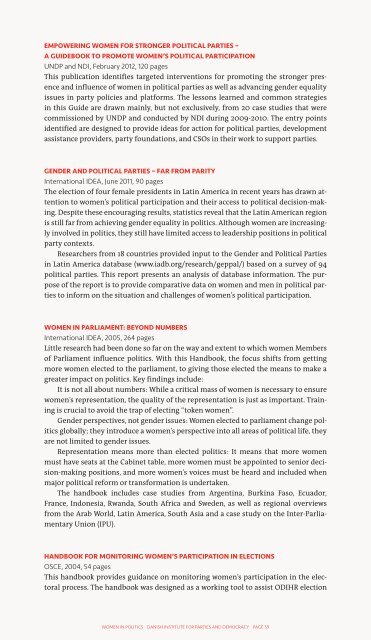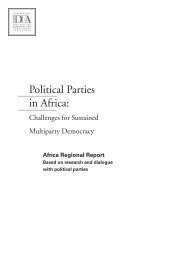Background Document - Danish Institute for Parties and Democracy
Background Document - Danish Institute for Parties and Democracy
Background Document - Danish Institute for Parties and Democracy
Create successful ePaper yourself
Turn your PDF publications into a flip-book with our unique Google optimized e-Paper software.
EMPOWERING WOMEN FOR STRONGER POLITICAL PARTIES –<br />
A GUIDEBOOK TO PROMOTE WOMEN’S POLITICAL PARTICIPATION<br />
UNDP <strong>and</strong> NDI, February 2012, 120 pages<br />
This publication identifies targeted interventions <strong>for</strong> promoting the stronger presence<br />
<strong>and</strong> influence of women in political parties as well as advancing gender equality<br />
issues in party policies <strong>and</strong> plat<strong>for</strong>ms. The lessons learned <strong>and</strong> common strategies<br />
in this Guide are drawn mainly, but not exclusively, from 20 case studies that were<br />
commissioned by UNDP <strong>and</strong> conducted by NDI during 2009-2010. The entry points<br />
identified are designed to provide ideas <strong>for</strong> action <strong>for</strong> political parties, development<br />
assistance providers, party foundations, <strong>and</strong> CSOs in their work to support parties.<br />
GENDER AND POLITICAL PARTIES – FAR FROM PARITY<br />
International IDEA, June 2011, 90 pages<br />
The election of four female presidents in Latin America in recent years has drawn attention<br />
to women’s political participation <strong>and</strong> their access to political decision-making.<br />
Despite these encouraging results, statistics reveal that the Latin American region<br />
is still far from achieving gender equality in politics. Although women are increasingly<br />
involved in politics, they still have limited access to leadership positions in political<br />
party contexts.<br />
Researchers from 18 countries provided input to the Gender <strong>and</strong> Political <strong>Parties</strong><br />
in Latin America database (www.iadb.org/research/geppal/) based on a survey of 94<br />
political parties. This report presents an analysis of database in<strong>for</strong>mation. The purpose<br />
of the report is to provide comparative data on women <strong>and</strong> men in political parties<br />
to in<strong>for</strong>m on the situation <strong>and</strong> challenges of women’s political participation.<br />
WOMEN IN PARLIAMENT: BEYOND NUMBERS<br />
International IDEA, 2005, 264 pages<br />
Little research had been done so far on the way <strong>and</strong> extent to which women Members<br />
of Parliament influence politics. With this H<strong>and</strong>book, the focus shifts from getting<br />
more women elected to the parliament, to giving those elected the means to make a<br />
greater impact on politics. Key findings include:<br />
It is not all about numbers: While a critical mass of women is necessary to ensure<br />
women’s representation, the quality of the representation is just as important. Training<br />
is crucial to avoid the trap of electing “token women”.<br />
Gender perspectives, not gender issues: Women elected to parliament change politics<br />
globally; they introduce a women’s perspective into all areas of political life, they<br />
are not limited to gender issues.<br />
Representation means more than elected politics: It means that more women<br />
must have seats at the Cabinet table, more women must be appointed to senior decision-making<br />
positions, <strong>and</strong> more women’s voices must be heard <strong>and</strong> included when<br />
major political re<strong>for</strong>m or trans<strong>for</strong>mation is undertaken.<br />
The h<strong>and</strong>book includes case studies from Argentina, Burkina Faso, Ecuador,<br />
France, Indonesia, Rw<strong>and</strong>a, South Africa <strong>and</strong> Sweden, as well as regional overviews<br />
from the Arab World, Latin America, South Asia <strong>and</strong> a case study on the Inter-Parliamentary<br />
Union (IPU).<br />
HANDBOOK FOR MONITORING WOMEN’S PARTICIPATION IN ELECTIONS<br />
OSCE, 2004, 54 pages<br />
This h<strong>and</strong>book provides guidance on monitoring women’s participation in the electoral<br />
process. The h<strong>and</strong>book was designed as a working tool to assist ODIHR election<br />
WOMEN IN POLITICS DANISH INSTITUTE FOR PARTIES AND DEMOCRACY PAGE 59
















